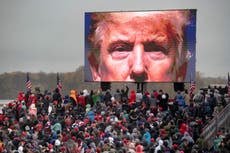Why Joe Biden does not need to prioritise fighting fascism
While it may seem as though Trump represents the fascistisation of the US, there’s a far bigger threat at play

At the outset of Donald Trump’s presidency, the US Christian historian David Montaigne asked whether his election might actually be a sign from God, the human embodiment of the “last trump” presaging the onset of the Apocalypse. Unless we are one of the US Dispensationalists looking for daily signs of the imminent Rapture of True Believers, we can safely put aside the absurd literalism that prompted such fundamentalist idiocy.
For one thing, it ignored the fact that only the St James version of the relevant passage in Corinthians would have been fulfilled by this extraordinary instance of “nominative determinism”: in the Italian New Testament, for example, the word for trump is “tromba”, and in the Norwegian “basun”!.
Yet, now that the orchestrated choruses of shrill screams from the recent hysteriocracy cease to assault our senses, it is perhaps a good moment to ponder what we can look forward to in a world soon to be bereft of Mr Trump. How will future political analysts assess his impact on the evolution of US democracy? Will his final ejection from the floodlight of media attention herald the dawn of a new era in the US in which the politics of social justice, substantive equality, and ecological sustainability (which he did his darndest to thwart) finally prevail?
Or will he have revealed the acuteness of another prophecy uttered by William Butler Yeats just over a century ago in the wake of the First World War? His poem The Second Coming foresaw apocalyptic “end times” of a different, more secular sort, where “the best lack all conviction, while the worst are full of passionate intensity”; where “rough beasts” slouch their way towards an abortive political delivery; where the rivets and pivots of a consensual political and moral order bend and shatter under the strain of populist pressures and centrifugal forces, opening up the space for grotesque episodes of mob rule and Neronian corruptions of state power.
One indicator of how his legacy may come to be seen is the ease with which his name has spawned a new ism among liberal pundits, column writers and political scientists. That this already bodes ill for how the inglorious page he has tweeted in the nation’s history will come to be seen can be inferred by other members of the elite group of politicians whose personal name lives on in a generic political term. (Napoleon) Bonaparte, Lenin, Stalin, Trotsky, Mao, Thatcher, Powell, Perón, Nasser, Franco, de Gaulle, Castro, Putin. This rogue’s gallery of diverse politicians has one common denominator, whether they technically remained within the democratic fold, presided over illiberal democracies, or installed a personal, socialist, or right-wing dictatorship: the populist and charismatic forces they were able to conjure up and sustain with their followers and broad sections of the public to legitimise their arbitrary use and abuse of power and delegitimise their opponents.
No wonder experts writing for major institutions of the liberal and free press so despised by the fake president have been quick to warn that Trumpism will far outlast Trump. It is thus worth identifying the peculiar animus of his spectacular, theatrical, sometimes vaudevillian, regime, which, like the spectre of communism conjured up by Marx in the opening lines of The Communist Manifesto, will come to haunt us like a ghost which refuses to be buried within the bones of his presidency. To phrase the question in Aristotelian terms: what is Mr Trump’s entelechy?
There is no shortage of pundits who would answer this in one word: fascism. With Mr Trump’s demonstrable xenophobia, Islamophobia, Latino-phobia, hyperpatriotism, misogyny, aporophobia (contempt for “losers”); with his disregard for democratic procedures, scorn for the separation of power, the freedom of the press, and science; with his connivance with the alt-right which apparently has as many “very fine people” in its ranks as anti-extremist protesters, it is easy to see why not just militant Marxists, bloggers and political cartoonists, but liberally educated politicians such as Madeleine Albright, a former secretary of state, sees Trumpism as symptomatic of the “rise of fascism”. During the first debate with Joe Biden, a beleaguered Trump appealed to the Proud Boys to “stand back and stand by”. Unsurprisingly, many glimpsed a fascist grimace as the mask slipped.
But this is surely to misread the threat posed by Trumpism. For all his bluster, he never saw his presidency as the prelude to a putsch or to the destruction of US constitutionalism from the inside. He is not going quietly, but he will go. To snatch victory from the jaws of Mr Biden, he has not turned to the military or the alt-right but to lawyers. Trumpism does not represent the attempted fascistisation of the US state, but its de-liberalisation, prising apart the binomial “liberal democracy” to turn it into what Viktor Orbán, the Hungarian prime minister, proudly calls an “illiberal democracy”. In Mr Trump’s head, the contempt for the rules and ethos of liberal democracy was legitimised by the ritualized displays of popularity in mass rallies. These resulted in a style of government that was plebiscitary and arbitrary rather than constitutional and representative. Furthermore, even if this style lent itself to be portrayed in a way reminiscent of Mussolini and Hitler when seen in news reports, the underlying political vision it expressed was much closer to Putin, Erdogan and right-wing populist movements.
Biden’s administration obviously needs to continue to fight fascism, even if it is highly marginalised, but there is an even more urgent need for it to confront the insidious dangers posed by the rise of illiberal democracy, right-wing populism, and identitarian politics. After all, these are a far greater threat to the planet in its present critical state than fascism. Only if he succeeds in revitalising the binomial “liberal democracy”, instead of prising it apart as Trump insisted on doing, then he can begin to shrink the US’s enormous democratic deficit.
It’s Alright, Ma, I’m only Bleeding, which the future Nobel Prize winner Bob Dylan wrote in 1965 against the background of the obscenities of the Vietnamese War and the Civil Rights Movement, an era of even more profoundly normalised betrayal of democracy and humane values, contains this verse:
“While one who sings with his tongue on fire / Gargles in the rat race choir / Bent out of shape from society's pliers / Cares not to come up any higher / But rather get you down in the hole that he's in”.
Mr Trump may have become a toothless tiger. But there is every danger that long after his self-exile to the golf-course, the spectre of Trumpism may yet manage to lure millions into the hole that he was in. With that at play, the progress the US so desperately needs to establish a just society and become a net contributor to a sustainable human civilisation abroad, will continue to be under direct threat.
Roger Griffin is Emeritus Professor in Modern History at Oxford Brookes University
Join our commenting forum
Join thought-provoking conversations, follow other Independent readers and see their replies
Comments




Bookmark popover
Removed from bookmarks